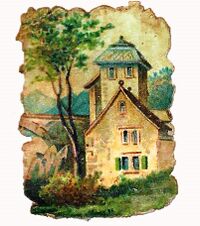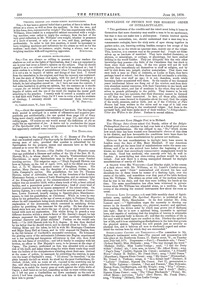Dr. Franz Hoffman on Spiritualism
The Sunday Herald of Denison, Texas, recently printed a translation of a letter sent by Dr. Franz Hoffman, Professor of Natural Philosophy at Wurzburg University, Germany, and Hon. Mem. of the British National Association of Spiritualists, to Messrs. Burhans and Kuehn, of Denison. In the course of the letter Dr. Hoffman says:—
The force manifesting itself in so-called mediums, if producing ideas, can but be a spiritual one. Either the ideas written down by the medium emanate unconsciously from his inner self, or from other spiritual beings. A fusion of both may take place with either of the factors predominating. By far the majority of cases point as their cause to spiritual beings beyond this world, and mostly to departed ones from earth-life. It were in vain to seek the cause of transmission of ideas in something devoid of ideas, or a mere {blind') natural force. Whoever seeks for such may find a something, but never the thing sought for. ... A large number of medial writings at least can only proceed from departed spirits, and prove, consequently, the continuation of man beyond this life; although the continuation, the immortality, can and has been proven philosophically, for instance by Bender, Heinrich, Ritter, Herman, and Ulrich, as also—in different modes, however—by Yon Leibnitz, Kant, Schelling, Meisner, and Fichte. The facts of so-called materialisations are entirely undeniable, and, to some extent, I deem even spirit photography certain. For a wider search in this sphere, should you feel inclined to investigate, I can recommend the periodical, Psychological Studies, by Aksakof, edited by Wittig, Leipzig, and published by Oswald Mutze.
This periodical is in its fifth annual course. You will find in almost every monthly number one of my articles, as also in a Spiritualistic-materialistic periodical published previously by Meisner and Mutze (two annual editions), in which you will meet with the best and most important information about Bender’s philosophical point of view, and also extracts from the fourth volume of his work, in which he anticipates
Spiritualism and spirit manifestations. Of German philosophers, aside from myself (Max Perty is more a naturalist), I. H. Fichte, the ingenious son of the great L G. Fichte (at present in the eighty-second year of his life), has in the third edition of his Anthropology declared himself openly for Spiritualism.
Shortly after this, Perty’s work appeared. The matter enters into a new stage in Germany through the genial astro-physicist Zollner, of Leipzig, who recently in the first volume of his Discussions of Physical Science, published at Leipzig by Starkman in 1878, records a successful experiment accomplished through him with the American medium Slade. This fact is very remarkable and will create quite a sensation. The February number of Psychological Studies contains an introductory essay on the matter.
Without the theory of spirit influence the apparitions cannot possibly be explained. That a strict investigator, a highly-gifted naturalist, should declare himself publicly for Spiritualism cannot be but of importance. Several Americans honour me with communications, for instance, Sargent, Bloede, Sylvan (Tiedeman), &c.
The eminent Russian privy councillor, Alexander Aksakof (not to be confounded with the pantheist of the same name), has published at Leipzig a library of Spiritualism in fourteen volumes, in the German language, among which can be found works by the Americans, Davis, Hare, Edmonds, Owens, and also by the Englishman, Wallace. For information for beginners two books of Wallace are most serviceable. Still more elementary is a book by Rechenberg, The Mystery of the Day (Leipzig: Spaner, 1853). Worthy of notice, especially, in consequence of undeniable facts, is the book by Philip Timm, Intimations of Some Important Points of Modern American Spiritualism and Harmonial Philosophy. New York, printed at New York Press, No. 7, Frankfort-street, 1873.
The fact that I have published the works of Franz Bender, the great philosopher (as Thomson calls him), in sixteen volumes, with introductions, notes, biography, and correspondence (1850-1860), may be known to you. Up to the present, five volumes of my philosophical works (1868-1878, Erlangen Deichert) have appeared. The remaining half shall follow, if sufficient public interest is manifested.
Crystallomancy
I Perceive in our friend the Reverend W. Stainton-Moses’s able summary of the work of the session, a brief reference to the paper on Crystallomancy, which I had the honour to read before the British National Association of Spiritualists on the 25th March last. There are two errors I in his notice that I am sure you will allow me to correct. The first is the presumption that the mirror spirits are the sub-humans of the Occultists. Nothing can be further from the fact, in so far as we trust the statements made by them —statements I have never had reason to doubt, they having been confirmed by numberless additional and unexpected circumstances. They are what they profess to be, spirits once on this or other earth, or spirits having superior intelligent being, but never embodied anywhere. I called it a new and peculiar world, because it has its own code of laws, its own system of metaphysics, its own views of the cosmical universe, and its own theological interpretation of the interrelations between God and man, God and His spirits and angels. Many of these views by no means coincided with those I had been led by education to entertain, nor do I hold them now they would startle Protestant and Roman Catholic alike, if given to the world. But the universe, being infinite in expansion, allows space, or rather states in which all opinions may be held. The myriad stellar regions are so placed, physically and spiritually, that their inhabitants behold the Author of All, each from a different standpoint; and, from the nature of things, each with a certain amount of imperfection. Hence no statement, however greatly supported, possesses more than a relative degree of authority. It is nevertheless possible, by the comparison of results, to arrive at some degree of approximation to general truth.
The second error is of very minor importance. Mr. Stainton-Moses says that my experience in the wide range of Spiritualism, proper has not been such as to enable me to grasp its significance. I might point out that in my paper I only professed to treat of mirrors, and crystals, and water vessels. I do not know, but I think that an experience extending from 1851 to 1878, during which time I have seen almost every form of Spiritualism known to exist, and some forms not known to Spiritualists at large, should have enabled me to do so.
I may be very dense, but I ultimately came to prefer the system of mirror and crystal work to any other, because by its means it was possible to explain the rest. Of forms I have not seen, I cannot judge. As to grasping the significance of Spiritualism, there are more ways than one of doing this. I take it, however, in its most serious sense, and I say sincerely and solemnly, either elect to treat its revelations, however given, with the same simplicity of mind you devote to your earthly form of faith, or decline to have anything to do with it. There is no occasion to stigmatise any phase presented; and all will then go well. I recommend no one to study any form of spiritual intercourse, unless prepared to accept the weighty responsibility which ensues when proselytes are sought, or the faith of others is attempted to be influenced.
Rather than one mind should be rendered unsettled and therefore unhappy, it would be better that the whole of this series of investigations should cease and determine. The ridicule which has been heaped upon it by the unthinking is of no moment at all; but there are many persons who get to a certain point at which they are frightened, and hence they cannot proceed. These people forget that above and beyond every phenomena, however terrifying in itself, is the Almighty Power, Wisdom, and Love of the Father of all angels and spirits, from whom alone we may hope to learn how “to grasp its significance.”
Hounslow, June 22, 1878.

Editor's notes
Sources
-
London Spiritualist, No. 305, June 28, 1878, p. 312


